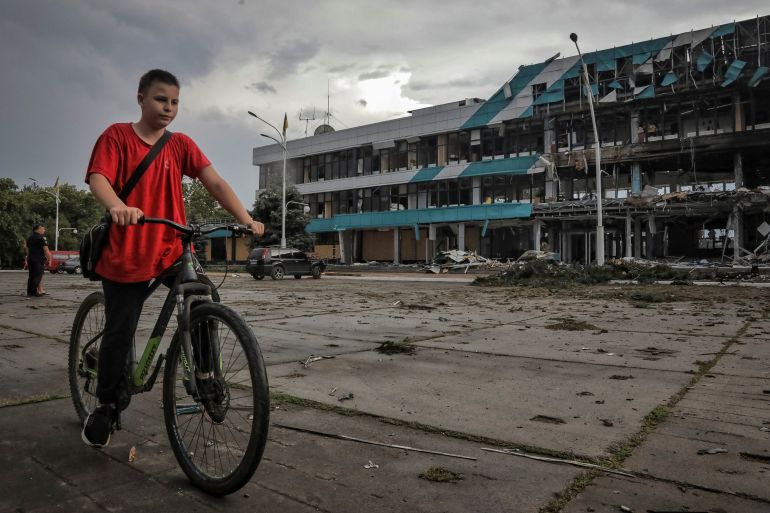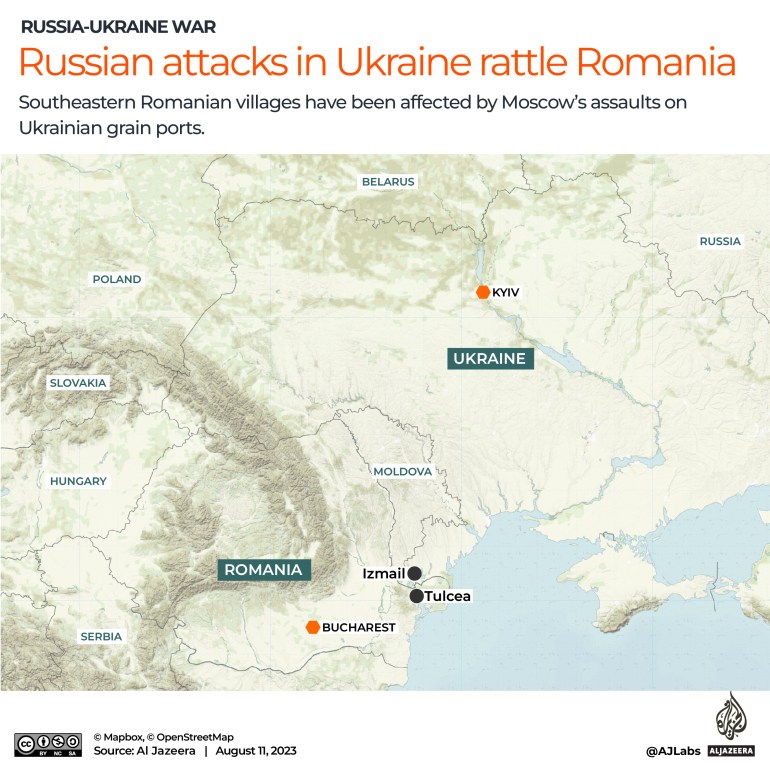Nerves, apathy as Russia’s war shakes Romanian towns near Ukraine
President Iohannis has decried Russia’s recent attacks on Danube ports near Romania, but as the war drops down the news agenda, others are less concerned.

Bucharest, Romania – Last Wednesday, a Russian drone attack on Ukraine’s grain port infrastructure shook Romania, a NATO member.
The force of the attack on the Izmail port, across the Danube River from the Eastern European nation, was so intense that the windows of some village homes in southeastern Romania shattered.
Keep reading
list of 4 itemsUkraine F-16 fighter pilot training to start soon in Romania
Russia’s war won’t stop me becoming chess grandmaster | Close Up
In Romania, Ukrainian children with special needs struggle
Even though she lives far from the county of Tulcea, where the impact was felt, 28-year-old Alexandra, a paralegal from the capital Bucharest, is concerned.
“We share a border with Ukraine and the conflict could expand at any moment,” she told Al Jazeera.
Russia has launched several attacks on Danube ports since pulling out of the wartime Black Sea grain deal.
Klaus Iohannis, the Romanian president, condemned the latest assaults as war crimes. Writing on social media, he said that Russia’s continued hammering of Ukrainian civilian infrastructure, “in the proximity of Romania”, is “unacceptable”.

Alexandra’s sense of anxiety has been simmering since the war erupted in February 2022.
“[I have felt] in danger, especially with all those helicopters flying everywhere. All those military operations, all the exercises, everything that Romania was doing [when the war started] felt like a red flag that something bad will happen. And I still worry.”
Bogdan, a civil servant in Cluj, is worried about war rhetoric expanding into the imaginations of other countries.
“Romania was also part of an empire, of several empires if we think about it. What if at this moment in time, an old empire would wake and claim that, ‘200 years ago, a part of Romania belonged to us, therefore from tomorrow, we are going to attack it’? These are outdated mentalities that are no longer related to current realities.”
But not everyone is as disturbed.
Shortly after the conflict began, a survey by Romania’s Center for Urban and Regional Sociology (CURS) found in April 2022 that 18 percent of Romanians were very fearful about the war while 53 percent were concerned about the cost-of-living crisis. More than a year later, in July 2023, CURS found that only 5 percent were worried about the war in Ukraine, while 67 percent listed the cost-of-living crisis and inflation as major causes of distress.
Mihai Lukacs, a 42-year-old theatre director from Bucharest, said even though last week’s attacks were near the border, “it means nothing.”
“I don’t feel the pressure because when it was presented in the news, it was presented like any other war that could be in Africa, in the Middle East, in Latin America. It is presented in the same way, that is, you do not make the difference in kilometres, and you do not necessarily feel that it is something close.”
Lukacs, who recently directed a play about the fears of nuclear war that were awoken by Russia’s invasion, sarcastically argued that the Romanian government “did a lot” for Ukraine.
“It purchased for itself submarines, aeroplanes. It paid a lot for armaments.”
The “true winners” of this conflict, he said, are arms dealers.
Ukraine war becomes ‘normalised’
Romania’s support for Ukraine throughout the war has been consistent.
The country of about 20 million people has welcomed thousands of Ukrainian refugees and sent military and humanitarian aid to Kyiv.
It has also tried to help boost the transit of Ukrainian grain, despite joining its neighbours in complaining that a glut imperilled local farmers.
But as elsewhere in Europe, the conflict has often dropped down on the news agenda.
“The discourse about the war in Ukraine still exists,” said Marius Ghincea, a researcher at the European University Insitute in Florence, “[but] it is no longer so prominent.
“If we look at the seven o’clock newscasts, if Ukraine occupied the first part of the news, now it reaches the second part. The interest is still there, but there is also an attrition. People got used to it, it became normalised.”
This “normalisation” has seen many Romanians ignore and avoid news of the war, or become altogether emotionally detached from the conflict.
Alexandra said she has not “watched much about it lately”.
“At first, while I was working, I had my TV on continuously listening to news from the battlefront and I was listening non-stop about Ukraine, but slowly, I got tired and followed it less,” she said.
Lukacs said while Romanians struggle with inflation, the Ukraine crisis is viewed as less important.
“I follow the news and there seems to be nothing new,” he said. “I can’t find any more information, there are no more burning [issues]. For now, the focus is on the budget reform … on more local topics, and problems related to serious social situations.”
Looking ahead, Bogdan expected that after the war ends, Ukrainian refugees will be burdened with shock if they return “and see the destruction that was done”.
Lukacs said the war will teach people about the threats of nuclear warfare, which he hopes will become “solidified in the public imagination”.
But Alexandra was far from optimistic.
“History repeats itself and that we have not learned anything,” she said. “In the 21st century, to have such a war and especially here on the border, it’s actually shocking.”